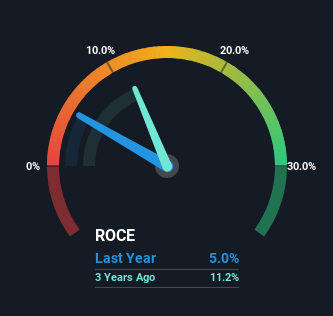- China
- /
- Specialty Stores
- /
- SHSE:600386
Returns On Capital Signal Difficult Times Ahead For Beijing Bashi Media (SHSE:600386)

What financial metrics can indicate to us that a company is maturing or even in decline? A business that's potentially in decline often shows two trends, a return on capital employed (ROCE) that's declining, and a base of capital employed that's also declining. This indicates to us that the business is not only shrinking the size of its net assets, but its returns are falling as well. So after glancing at the trends within Beijing Bashi Media (SHSE:600386), we weren't too hopeful.
What Is Return On Capital Employed (ROCE)?
Just to clarify if you're unsure, ROCE is a metric for evaluating how much pre-tax income (in percentage terms) a company earns on the capital invested in its business. To calculate this metric for Beijing Bashi Media, this is the formula:
Return on Capital Employed = Earnings Before Interest and Tax (EBIT) ÷ (Total Assets - Current Liabilities)
0.05 = CN¥149m ÷ (CN¥4.5b - CN¥1.6b) (Based on the trailing twelve months to September 2024).
So, Beijing Bashi Media has an ROCE of 5.0%. On its own that's a low return on capital but it's in line with the industry's average returns of 5.0%.
View our latest analysis for Beijing Bashi Media

Historical performance is a great place to start when researching a stock so above you can see the gauge for Beijing Bashi Media's ROCE against it's prior returns. If you'd like to look at how Beijing Bashi Media has performed in the past in other metrics, you can view this free graph of Beijing Bashi Media's past earnings, revenue and cash flow.
How Are Returns Trending?
We are a bit worried about the trend of returns on capital at Beijing Bashi Media. About five years ago, returns on capital were 9.6%, however they're now substantially lower than that as we saw above. Meanwhile, capital employed in the business has stayed roughly the flat over the period. This combination can be indicative of a mature business that still has areas to deploy capital, but the returns received aren't as high due potentially to new competition or smaller margins. So because these trends aren't typically conducive to creating a multi-bagger, we wouldn't hold our breath on Beijing Bashi Media becoming one if things continue as they have.
The Bottom Line
All in all, the lower returns from the same amount of capital employed aren't exactly signs of a compounding machine. In spite of that, the stock has delivered a 12% return to shareholders who held over the last five years. Regardless, we don't like the trends as they are and if they persist, we think you might find better investments elsewhere.
One more thing: We've identified 2 warning signs with Beijing Bashi Media (at least 1 which can't be ignored) , and understanding them would certainly be useful.
If you want to search for solid companies with great earnings, check out this free list of companies with good balance sheets and impressive returns on equity.
Valuation is complex, but we're here to simplify it.
Discover if Beijing Bashi Media might be undervalued or overvalued with our detailed analysis, featuring fair value estimates, potential risks, dividends, insider trades, and its financial condition.
Access Free AnalysisHave feedback on this article? Concerned about the content? Get in touch with us directly. Alternatively, email editorial-team (at) simplywallst.com.
This article by Simply Wall St is general in nature. We provide commentary based on historical data and analyst forecasts only using an unbiased methodology and our articles are not intended to be financial advice. It does not constitute a recommendation to buy or sell any stock, and does not take account of your objectives, or your financial situation. We aim to bring you long-term focused analysis driven by fundamental data. Note that our analysis may not factor in the latest price-sensitive company announcements or qualitative material. Simply Wall St has no position in any stocks mentioned.
About SHSE:600386
Excellent balance sheet with acceptable track record.
Similar Companies
Market Insights
Community Narratives




